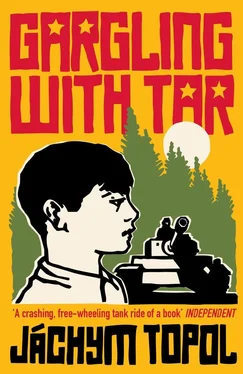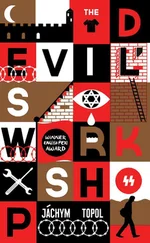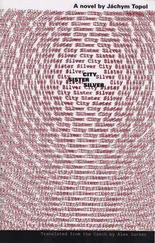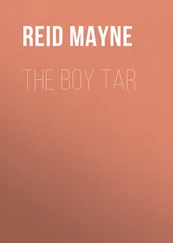We tried to live a normal life in Luka. My duties included feeding the troublesome Dago. I stuffed captured provisions into his mouth with my very own fingers. Shackled as he was, he amused both himself and me by cleverly shrinking and swelling. Slipping out of his bonds was child’s play to him. I didn’t report him, though I should have.
We were trying to live a normal life, but we weren’t very good at it.
Under the command of Gunner Kantariya I went to fetch some water from a well in this newly conquered territory. It was guarded by our sub-machine-gunners. Gunner Kantariya winched up the metal bucket full of water, then he staggered and it went plummeting back down the well. Gunner Kantariya leaned on the wall of the well and puked.
I stared down into the depths, which were lined with cold, wet stones. Rays of sunlight danced on the metal bucket and illuminated the water that had been churned up by its fall, and I saw an animal’s corpse. First I thought it was a gigantic, bloated pig, but in fact it was a hippo. The water wasn’t fit to drink.
The Czechs were treating our tank column to scorched earth tactics.
During the night we made a barrow.
*
For once Captain Yegorov didn’t need me on guard duty. No one in our tank column slept that night. Surrounded by a chain of guards, supported by a fan-shaped grouping of patrols, we soldiers of the tank column set out, under the command of Captain Yegorov, for the clearing in the forest, where we dismantled the animal enclosure. Then we dug a hole with entrenching tools, bayonets and knives. We worked quietly, the occasional clink when a spade hit a stone, or the noise of soldiers snapping or cutting through a root, didn’t even reach the patrols. The work was hard, but we proceeded without a word, as silently as the leaves falling through the darkness into the forest grass. I carried the dug-up soil to the spot designated and soon it was a mound as high as a man. That’s how to make a barrow.
At daybreak we placed the bodies of our fellow warriors into the excavated pit. I played no part in fetching their bodies from the two pickups; I didn’t have the strength. The corpses in sacks covered the bottom of the pit. The soldiers aside set their spades and bayonets and stood there motionless, weapons in hand.
Captain Yegorov strode around the perimeter of the hole and called his fallen men by name one last time: Sergei, Abram, Ivan, Ivar, Volodya, Igor, Mikhailo, Maksim, Lev, Evgenii, Nikita — a long string of names. I only ever caught the first name, never the — ovich part. I can’t remember them all. That wasn’t my job anyway. My task was to gather the spades where they’d been dropped into a sack and drag the sack over to the black mound of excavated soil.
I was teamed up with Gunner Kantariya. We were standing beside the heap of excavated soil and waiting until Captain Yegorov had spoken to all of our fallen comrades. Roots and branches poked out of the heap of excavated soil, and pebbles glinted in the pale light of day. Gunner Kantariya wept. I glanced sideways: real tears. I pretended not to have noticed. If Gunner Kantariya had caught me watching him cry, things might have become awkward. I didn’t want things to go too far.
The first to take up a spade and sink it into the pile of earth was Captain Yegorov. In total silence and with everyone looking on, he took it to the mass grave and tipped the dirt over the nearest sack. Following his example, the other soldiers of the column did likewise, one after another. I wanted to as well, but Gunner Timosha caught me by the sleeve and shook his head. I carried on guarding the sack of spades.
After every man had made a trip from the pile of earth to their fallen comrades, they came over to me, collected the spades and filled in the hole. The corpses were covered, and the soldiers went on heaping soil onto the grave. They worked hard and soon there was quite a hill rising over the corpses. To my short question, Gunner Timosha provided a terse answer: ‘It’s a kurgan, a burial mound.’ Then we tramped this way and that over the kurgan, treading it down. That was something I could do. Then on top of the kurgan the soldiers tipped old, dry soil and twigs and pebbles and leaves. They used their knives to cut away all the bushes around and about, and turfs and saplings, and they set them elaborately on the kurgan. Soon the mound looked like any mound in Chapman Forest and not like a burial site of fallen Soviet soldiers. My handbooks had mentioned nothing about this.
On the way through the woods we soon spotted the tanks. We exchanged greetings with the patrols and the despondency with which I had learned how to bury people fell away… Gunner Kantariya and I got back last, because we were dragging the sack full of spades; the others were already by the tanks. Suddenly, in a crazy burst of noise, the forest around us changed. Bushes and grasses turned white and pink, and towards us and over our heads flew a flock of huge birds with gigantic beaks. The shuddering noise was the beating of their wings. Gunner Kantariya dropped the sack, which landed with a thump on my foot. He started pulling picture after picture out of his pocket, and when he shoved a picture of a flamingo where I could see it — a picture I knew from a section in The Catholic Book of Knowledge about the lives of the saints — he didn’t wait for my verdict, but screamed, ‘Flamingo! Flamingo!’ Under the flying flamingoes we staggered along with the sack towards the assembled troops. Every soldier was following the stream of pink with staring, goggling eyes, focused solely on the flock as it vanished into the distance. If the Czechs had attacked us then, they’d have had us easy.
We had found the remains of the circus, that was more than obvious. And the murder of the giraffe and the hippo suggested that the Czechs had destroyed it completely.
A crazed Kantariya begged Captain Yegorov to let him skin the dead hippo, then cover the tank with its hide like a regimental flag, armouring our vehicle with animal skin. The hippo’s head in particular, he insisted, would put the wind up the Czech bandits should they attack us, but Captain Yegorov forbade him to turn our tank into a hippo, and Kantariya came very close to ending up in shackles like Dago. Kantariya’s railing merged with Dago’s wailing, as he expressed his concern in German and Russian for the girls who had performed with the East German circus. His words filled us with dread, as we remembered what had happened to the giraffe and the hippo. ‘It’s hard to believe they’d let those wondrously beautiful creatures go free like the wild birds,’ Dago moaned, and he banged his head against the tank’s armour plating. ‘They’re bound to be languishing in the insurgents’ smoke-filled cottages and underground bunkers, enslaved to those primitive yokels with no perfume or soap or applause!’ Dago screamed and stormed and cursed, and we were glad he was tied up.
Captain Yegorov gave orders to bivouac in the vicinity of Luka and check for any trace of the vanished circus.
I continued in my role of interpreter and provider of intelligence.
After several early clashes, the Czechoslovak People’s Army stopped attacking us. The actions of the armed gangs of Siaz also seemed to have come to a halt. The fighters had apparently withdrawn to the Prague — Beroun — Pilsen line, where the main offensive of the Czechoslovak People’s Army against the occupying armies of the five Warsaw Pact nations was taking place.
I took off my headphones and handed a report to Captain Yegorov. My axle grease-blackened face didn’t worry him. On the contrary. The forest seemed to be conspiring against us… in the area around Luka we were attacked by clouds of midges. The axle grease daubed all over my face didn’t keep them away, nor did it relieve the pain of countless bites, but at least the insects stuck to my face and could be easily neutralized. The rest of the soldiers in our column also started putting axle grease on their faces. The black of their faces was blotched with the squashed and bloody bits of dead midges. The soldiers’ teeth shone white, as did their eyes, otherwise their faces were a mask of blood and black. When captured bandits were being interrogated I discovered that it also had an undeniable effect psychologically.
Читать дальше












